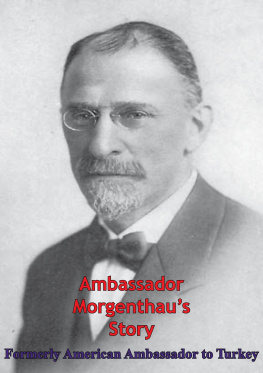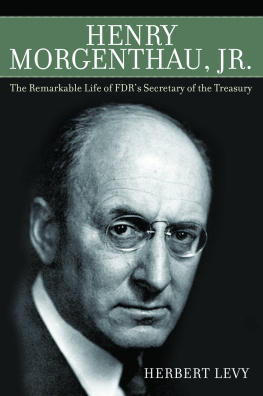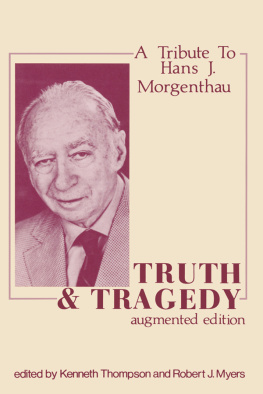Zimmer Louis B. - The Vietnam War Debate: Hans J. Morgenthau and the Attempt to Halt the Drift into Disaster
Here you can read online Zimmer Louis B. - The Vietnam War Debate: Hans J. Morgenthau and the Attempt to Halt the Drift into Disaster full text of the book (entire story) in english for free. Download pdf and epub, get meaning, cover and reviews about this ebook. year: 2011, publisher: Lexington Books, genre: Politics. Description of the work, (preface) as well as reviews are available. Best literature library LitArk.com created for fans of good reading and offers a wide selection of genres:
Romance novel
Science fiction
Adventure
Detective
Science
History
Home and family
Prose
Art
Politics
Computer
Non-fiction
Religion
Business
Children
Humor
Choose a favorite category and find really read worthwhile books. Enjoy immersion in the world of imagination, feel the emotions of the characters or learn something new for yourself, make an fascinating discovery.

- Book:The Vietnam War Debate: Hans J. Morgenthau and the Attempt to Halt the Drift into Disaster
- Author:
- Publisher:Lexington Books
- Genre:
- Year:2011
- Rating:3 / 5
- Favourites:Add to favourites
- Your mark:
- 60
- 1
- 2
- 3
- 4
- 5
The Vietnam War Debate: Hans J. Morgenthau and the Attempt to Halt the Drift into Disaster: summary, description and annotation
We offer to read an annotation, description, summary or preface (depends on what the author of the book "The Vietnam War Debate: Hans J. Morgenthau and the Attempt to Halt the Drift into Disaster" wrote himself). If you haven't found the necessary information about the book — write in the comments, we will try to find it.
Zimmer Louis B.: author's other books
Who wrote The Vietnam War Debate: Hans J. Morgenthau and the Attempt to Halt the Drift into Disaster? Find out the surname, the name of the author of the book and a list of all author's works by series.
The Vietnam War Debate: Hans J. Morgenthau and the Attempt to Halt the Drift into Disaster — read online for free the complete book (whole text) full work
Below is the text of the book, divided by pages. System saving the place of the last page read, allows you to conveniently read the book "The Vietnam War Debate: Hans J. Morgenthau and the Attempt to Halt the Drift into Disaster" online for free, without having to search again every time where you left off. Put a bookmark, and you can go to the page where you finished reading at any time.
Font size:
Interval:
Bookmark:
I never met Hans J. Morgenthau personally. I first saw him on television when he was a participant at the May 15, 1965, national teach-in which took place at the Sheraton Hotel in Washington, D.C. The next day, May 16, I watched Morgenthau reply to questions posed by moderator Lawrence Spivak on Meet the Press . Here, Morgenthau repeated and provided new arguments against the war. A month later, on June 21, I watched Morgenthau debate national security adviser McGeorge Bundy on CBS television.
In the spring of 1965, I was a young assistant professor of history at Montclair State College, now Montclair State University, while completing my Ph.D. dissertation on the political and moral philosophy of the English utilitarian thinker, John Stuart Mill (18061873). I first became familiar with Morgenthaus two major works, Politics among Nations and In Defense of the National Interest , which were on the required reading lists for two diplomatic history courses I had taken as a graduate student at New York University. I also read for my Ph.D., as part of my minor outside the Department of History, studies in International Relations within the Department of Political Science, where the reading lists also included Morgenthaus major works. Moreover, I was also a subscriber to The New Republic and thus a close reader of Morgenthaus many articles on the war which proved demonstrably the weaknesses of the governments position, indeed, the futility of the entire American enterprise in Vietnam.
As I read President Johnsons defense of the war and watched Secretary of Defense McNamaras news conferences and his explanations of U.S. policythe defense of a non-existent freedom in South Vietnam, a theory of falling dominoes, which had no support in history, a failure to acknowledge the conflict between North and South Vietnam as a civil war among indigenous Vietnamese, a confusion about Communism as a monolithic threat when the monolith had become fragmented into national communist states, repeated references to Munich as analogical justifications for American military action in Vietnam, it became apparent that the United States was engaged in a needless war. Morgenthaus arguments against the war made perfect sense, and I became an opponent of the war based largely on Morgenthaus articles in The New Republic . As the American military involvement escalatedon March 31, 1965, two battalions of marines arrived in South Vietnam, and on July 28, another 50,000 troops were dispatched to VietnamI became an active participant at several informal meetings among faculty and students in discussions of the war, where I presented the geopolitics of Morgenthaus positions. I also enlisted Morgenthaus textbook commentaries in my European history classes when the subject turned to the major international peace settlements, such as the Congress of Westphalia in 1648, which ended the Thirty Years War, the Congress of Vienna in 1815 when Napoleon was defeated, and the Congress of Versailles in 1920 following the end of World War I.
In 1992, I accepted the early retirement package generously offered to senior faculty after thirty years of teaching and was awarded Emeritus status. My special field of academic studies was European and English intellectual history. The electives I taught to both graduate and undergraduate students included Studies in Enlightenment History and Nineteenth Century Intellectual History. I published articles and reviews in The Journal of British Studies, The Mill News Letter, The Historian, MetaPhilosophy, The American Historical Review, Eighteenth Century Studies, Victorian Studies, Proceedings of the Consortium on Revolutionary Europe . In the immediate years of my retirement, I began the study of literary theory and published in the fall of 1998 a spoof of deconstructionism in The Virginia Quarterly Review . In that article, I resurrected the great Voltaire to engage in debate with the twentieth-century guru of deconstruction, the late Jacques Derrida, a dialogue based essentially on their published writings. The title of my spoof is Jacques et FrancoisVoltaires name is Francois Marie Arouet, to which he added de Voltaireand is the last of my publications related to my special field of academic studies.
In the years preceding the appearance of Jacques et Francois, I also began the study which led to this book. Thus, in 1995, Robert S. McNamara, the former Secretary of Defense under Presidents Kennedy and Johnson and a chief architect of the war, published In Retrospect: The Tragedy and Lessons of Vietnam . Here, McNamara claimed the war was a mistake. We were wrong, terribly wrong, he wrote. His concluding chapter contained thirteen lessons he believed could avert future Vietnams which bore remarkable similarities to Morgenthaus strictures against the war written thirty years earlier. Yet, there is no mention of Morgenthau in the McNamara book. There is no mention of the debates and teach-ins several of which took place near his Pentagon office while he was picking bombing targets with President Johnson. In his news conferences back in 1965, there was never any hint that he might be wrong. He appeared frequently with map and pointer, exuding supreme confidence, absolutely certain that his quantitative assessments of infiltrators, captured enemy weapons, and kill ratios would guarantee a military victory.
I was appalled. I regarded In Retrospect as a self-serving confessional the conclusions of which were known thirty years earlier. I began rereading old copies of The New Republic stored in my basement and clipping the many Morgenthau articles that proclaimed that the war was never a vital national security interest for the United States. I photocopied reports on the war contained in the weekly news magazines at nearby Rutgers and Princeton University libraries. In the spring of 1998, I made the first of several trips to the Library of Congress to read the Morgenthau papers. I obtained photocopies of related materials from the Lyndon Baines Johnson Library in Austin, Texas. I made several trips to the John F. Kennedy Library at Dorchester, Massachusetts. I received additional material from historical research collections around the country. As the pattern of my research unfolded, which included the chief critic of the war and those in government and in the press who promoted the war, the organizing title of my book was The Charade of the Best and Brightest: Hans J. Morgenthau and the National Debate on Vietnam. After ten years of research and writing, I had a double-spaced manuscript that exceeded some 900 pages. After conferring with my first editor at Lexington, I was advised to write two books: one on the critic, the second on the Presidents whose leadership propelled the United States into the tragedy of Vietnam.
After another year of writing and editing, the result is contained in these pages. It is the story of a great man who first established the specialized study of international relations with the publication of his earliest books and who then applied the principles contained in those studies that appeared in hundreds of articles and public forums in the attempt to alter American policy in Vietnam. He did not succeed, but he did leave a rich legacy of instructive foreign policy advice and analysis that may serve well in avoiding future unnecessary wars. It is my hope that this book will contribute to the realization of that goal.
It is a truism that librarians are special people: they serve their patrons in countless ways and, in my experience, with boundless dedication and extraordinary patience. In the course of the past twelve years, I have been the grateful beneficiary of their invaluable help in a variety of ways: they have introduced and assisted me in negotiating the database systems to obtain photocopies of newspaper and periodical material; they have either sent me photocopies of finding aids or have instructed me on how I may find certain select documents among a vast assortment of material supplied on the internet that are not, for this researcher, quickly and easily mastered; this is particularly so because I am not technologically proficient; I also work alone, and my sole research assistant is my wife. These librarians, these special people, have always and with great patience answered my questions though, I suspect, they politely concealed their bemusement at what I should have been able to figure out for myself; they have also, in several instances, taken the time to help me thread microfilm, a task I still endure with some embarrassed bewilderment.
Font size:
Interval:
Bookmark:
Similar books «The Vietnam War Debate: Hans J. Morgenthau and the Attempt to Halt the Drift into Disaster»
Look at similar books to The Vietnam War Debate: Hans J. Morgenthau and the Attempt to Halt the Drift into Disaster. We have selected literature similar in name and meaning in the hope of providing readers with more options to find new, interesting, not yet read works.
Discussion, reviews of the book The Vietnam War Debate: Hans J. Morgenthau and the Attempt to Halt the Drift into Disaster and just readers' own opinions. Leave your comments, write what you think about the work, its meaning or the main characters. Specify what exactly you liked and what you didn't like, and why you think so.









